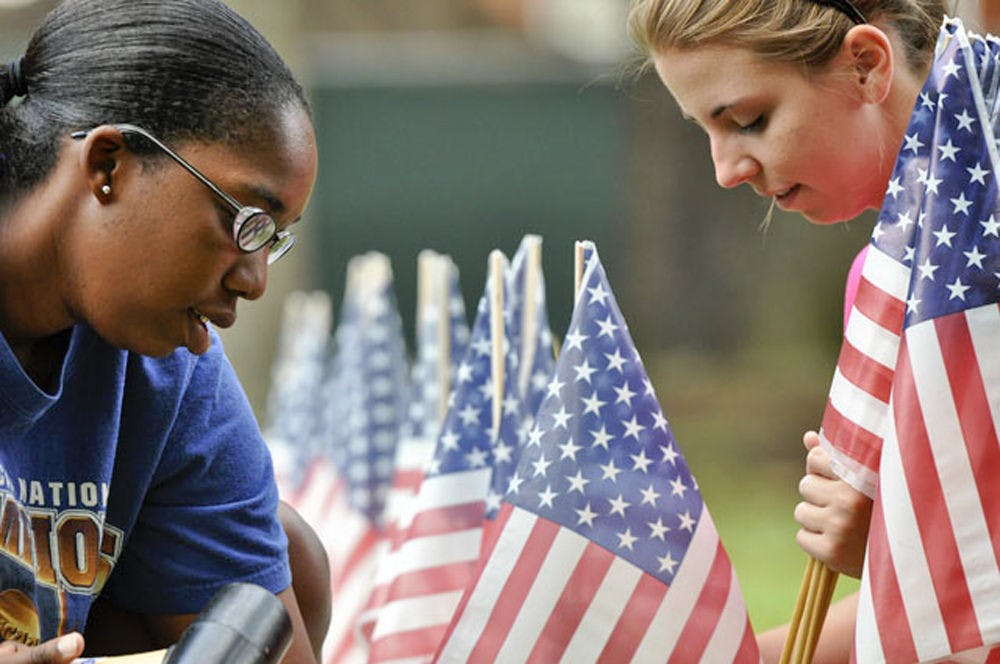Isabella Sorressi was 4 years old the morning the Twin Towers went down on Sept. 11, 2001
She didn’t have school that day, and she didn’t know why the TV stayed on. She said she didn’t understand why her dad came home upset. She didn’t understand why her dad was frantically calling family members in New York.
"When you’re young, you don’t know what’s going on," the UF journalism freshman said. "I didn’t get it until a few years later."
Her grandparents lived in New York, and she said her family was concerned about them.
"It’s weird because every year in school at this time, people assume everyone has a story," she said.
But Sorressi, 18, said her memories are a little vague.
"When people who were my age remember something like that, it’s usually because something really significant happened — I’m lucky that I don’t," she said.
• • •
Taariq Imami doesn't remember much about 9/11 except feeling like everything stopped.
"I didn’t really understand what was going on at the time because I was only 6," Imami, a UF computer science junior, said.
He is from Melbourne, Florida, but he said the aftermath of the tragedy affected him.
"I’m Muslim, and it seems like a lot of people, like, turned on that religion and were afraid of it after," he said.
He said there are people who don’t understand what his religion is and link it to terrorism.
Now, Imami is a certified pilot.
When he started flying, he said people cracked jokes.
"People are always making assumptions that certain groups are terrorists, which isn’t the case," Imami said. "Some people just take it to the extreme."
He said his parents were shocked when the terrorist attacks happened.
"We felt like it was an attack on our homeland because we live here," Imami said.
• • •
Nick Deering was 7 years old when the Twin Towers fell. He was in his second-grade classroom until his dad came to get him.
He said he remembers seeing it on the news but didn’t fully understand what was happening.
"I think I was old enough to realize everything wasn’t OK," the UF finance senior said. "I was too young for it to really have an impact."
He said his mom tried to call his uncle that day. He had been flying in the Navy when the towers fell. He was OK.
"It was a frantic time period," Deering said.
• • •
Linda Smith was sitting in the Office of the Dean for Research when she heard about the terrorist attacks.
A 37-year-old secretary at the time, she found out from Douglas Archer, the current associate dean for research.
"He told us ‘Did you hear? It just happened,’" she said.
She and the other assistants turned on the television in time to see the second tower come down.
"My first thought was, ‘I need to find out where my children are,’" Smith said.
They were 4 and 6.
Smith said she called her sister, who was working for the National Parks Service in Washington, D.C., at the time.
"I was one of the last people to get through before the line was cut," she said.
Smith, now a 52-year-old administrative assistant in the same office, said she didn’t fly for a long time after. She finally went to the Newseum in Washington, D.C., in 2012 and saw the 9/11 exhibit.
"It was sad," she said. "But when you hear the stories of those who survived, it made me feel proud to be an American."
She said she will always remember the 9/11 attacks.
"You just hugged your family a little tighter," she said.
• • •
Lynn Leverty, a UF political science senior lecturer, said she didn't hear the usual sounds of UF when she walked onto campus the day the towers fell.
"The campus was eerily quiet," she said. "Nobody was around, which seemed really strange."
Then a lecturer in her early 40s, Leverty walked into Anderson Hall to find the faculty lounge packed with professors watching the buildings crumble on TV, she said.
The political ethics class she taught that day was nearly empty, but the students who were there were anxious to talk.
"I think they just wanted to be together and have somebody to talk to rather than just sort of wandering the campus," she said. "I think all of us were just in shock."
Leverty said she felt she had to include discussions on terrorism in her class.
"I didn’t feel like you could ignore the biggest thing that had happened in many, many years," she said. "So yeah, it did change things a bit."
Natalie Ford and Jessica Gordon tap flags into the ground Sept. 6, 2010. The flags are part of a 9/11 memorial sponsored by College Republicans and Network of enlightened Women in the Plaza of the Americas.






